One summer evening drunk to hell
I stood there nearly lifeless
An old man in the corner sang
Where the water lilies grow(1)
And on the jukebox Johnny(2) sang
About a thing called love
And it's how are you kid and what's your name
And how would you bloody know?
In blood and death 'neath a screaming sky
I lay down on the ground
And the arms and legs of other men
Were scattered all around
Some cursed, some prayed, some prayed then cursed
Then prayed and bled some more
And the only thing that I could see
Was a pair of brown eyes that was looking at me
But when we got back, labeled parts one to three
There was no pair of brown eyes waiting for me
And a rovin' a rovin' a rovin' I'll go
For a pair of brown eyes
I looked at him he looked at me
All I could do was hate him
While Ray and Philomena sang(3)
Of my elusive dream
I saw the streams, the rolling hills
Where his brown eyes were waiting
And I thought about a pair of brown eyes
That waited once for me
So drunk to hell I left the place
Sometimes crawling sometimes walking
A hungry sound came across the breeze
So I gave the walls a talking
And I heard the sounds of long ago
From the old canal
And the birds were whistling in the trees
Where the wind was gently laughing
And a rovin' a rovin' a rovin' I'll go
For a pair of brown eyes
I stood there nearly lifeless
An old man in the corner sang
Where the water lilies grow(1)
And on the jukebox Johnny(2) sang
About a thing called love
And it's how are you kid and what's your name
And how would you bloody know?
In blood and death 'neath a screaming sky
I lay down on the ground
And the arms and legs of other men
Were scattered all around
Some cursed, some prayed, some prayed then cursed
Then prayed and bled some more
And the only thing that I could see
Was a pair of brown eyes that was looking at me
But when we got back, labeled parts one to three
There was no pair of brown eyes waiting for me
And a rovin' a rovin' a rovin' I'll go
For a pair of brown eyes
I looked at him he looked at me
All I could do was hate him
While Ray and Philomena sang(3)
Of my elusive dream
I saw the streams, the rolling hills
Where his brown eyes were waiting
And I thought about a pair of brown eyes
That waited once for me
So drunk to hell I left the place
Sometimes crawling sometimes walking
A hungry sound came across the breeze
So I gave the walls a talking
And I heard the sounds of long ago
From the old canal
And the birds were whistling in the trees
Where the wind was gently laughing
And a rovin' a rovin' a rovin' I'll go
For a pair of brown eyes
(1) This might be a stretch, but "Where the water lillies grow" is the chorus to the 19th century ballad "Agnes by the River.
(2) "Johnny" might refer to Johnny McEvoy (a country artist who came to prominence on the Irish music scene in the 1960s, and was likened to an "Irish Bob Dylan") since among his hits were a version of "Muirshin Durkin" and a tune called "Those Brown Eyes." However in an interview Shane says it refers to the "Man in Black," Mr. Johnny Cash. Cash recorded an album and song (released in 1972) called "A Thing Called Love":
(3)
Ray Lynam and The Hillbillies became a fixture on the Irish record charts in the late 1960s and one of the leading country music artists in Ireland. During the 1980s Lynam had a weekly gig at Dublin's Harcourt Hotel. He is still singing and touring throughout Ireland. Philomena Begley is also an active country artist in Ireland. Indeed, in January 2000 she was awarded the 'Millennium Inspirational Award' from Country Music Ireland at its inaugural awards ceremony.
Notes from Poguetry.com
(2) "Johnny" might refer to Johnny McEvoy (a country artist who came to prominence on the Irish music scene in the 1960s, and was likened to an "Irish Bob Dylan") since among his hits were a version of "Muirshin Durkin" and a tune called "Those Brown Eyes." However in an interview Shane says it refers to the "Man in Black," Mr. Johnny Cash. Cash recorded an album and song (released in 1972) called "A Thing Called Love":
"It's just about a guy getting pissed at a bar round here," says Shane nonchalantly. "He's getting pissed because he's broken up with this bird and... you know how it is when you just go into a pub on your own to drink and it's really quiet and you get this old nutter who comes over and starts rambling on you. So this old guy starts on about how he came back from the war, the First World War. Or the Second. One of them anyway. And he tells him about the ship he had out there and how he got out and came back and this girl had fucked off with someone else, a girl with a pair of brown eyes. Which is the same situation as the young guy sitting there listening to all this rubbish and the juke box playing Johnny Cash and ...
(3)
Ray Lyman [sic] and Philomena Begley, classic London juke box tracks. And in the end he gets to the stage where he says fuck it, and he goes stumbling out of the pub and he walks along the canal and starts feeling really bad, on the verge of tears, and he starts realising that the old guy has had a whole fucking lifetime of that feeling, going through the war and everything, but his original reaction is to hate him and despise him. I'm not saying he goes back and starts talking to him but you know...
Ray Lynam and The Hillbillies became a fixture on the Irish record charts in the late 1960s and one of the leading country music artists in Ireland. During the 1980s Lynam had a weekly gig at Dublin's Harcourt Hotel. He is still singing and touring throughout Ireland. Philomena Begley is also an active country artist in Ireland. Indeed, in January 2000 she was awarded the 'Millennium Inspirational Award' from Country Music Ireland at its inaugural awards ceremony.
Notes from Poguetry.com
Lingua: Italiano
Versione italiana di Kiocciolina
UN PAIO DI OCCHI CASTANI
Una sera d'estate ubriaco perso
Stavo lì quasi senza vita
Un vecchio nell'angolo cantava
"Dove crescono i gigli d'acqua"
E dal jukebox Johnny cantava
Di una cosa chiamata amore
Ed è "come stai, ragazzo?" e "Come ti chiami?"
E "Come diavolo sai?"
Nel sangue e la morte sotto un cielo urlante
Giaccio a terra
E le braccia e le gambe di altri uomini
Mi sono tutto intorno
alcuni bestemmiavano, altri pregavano, altri pregavano e poi bestemmiavano
Poi pregavano vomitavano ancora
E la sola cosa che riuscivo a vedere
Erano un paio di occhi castani che mi fissavano
Ma quando tornammo
Non c'era alcun paio di occhi castani che mi aspettavano
E itinerando itinerando itinerando andrò
Cercando un paio di occhi castani
L'ho guardato e lui mi ha guardato
Tutto ciò che riuscivo a fare era odiarlo
Mentre Ray e Philomena cantavano
Del mio sogno inafferrabile
Ho visto ruscelli, le colline
Dove i suoi occhi castani stavano aspettando
E ho pensato ad un paio di occhi castani
Che un tempo aspettavano me
Così ubriaco a pezza ho abbandonato il posto
Un po' strisciando, un po' camminando
Un suono famelico giunse con la brezza
Perciò ho scambiato una chiacchiera con i muri
Ed ho ascoltato i suoni di tanto tempo fa
Dal vecchio canale
E gli uccelli stavano fischiando sugli alberi
Dove il vento stava gentilmente ridendo
E itinerando itinerando itinerando andrò
Cercando un paio di occhi castani
Una sera d'estate ubriaco perso
Stavo lì quasi senza vita
Un vecchio nell'angolo cantava
"Dove crescono i gigli d'acqua"
E dal jukebox Johnny cantava
Di una cosa chiamata amore
Ed è "come stai, ragazzo?" e "Come ti chiami?"
E "Come diavolo sai?"
Nel sangue e la morte sotto un cielo urlante
Giaccio a terra
E le braccia e le gambe di altri uomini
Mi sono tutto intorno
alcuni bestemmiavano, altri pregavano, altri pregavano e poi bestemmiavano
Poi pregavano vomitavano ancora
E la sola cosa che riuscivo a vedere
Erano un paio di occhi castani che mi fissavano
Ma quando tornammo
Non c'era alcun paio di occhi castani che mi aspettavano
E itinerando itinerando itinerando andrò
Cercando un paio di occhi castani
L'ho guardato e lui mi ha guardato
Tutto ciò che riuscivo a fare era odiarlo
Mentre Ray e Philomena cantavano
Del mio sogno inafferrabile
Ho visto ruscelli, le colline
Dove i suoi occhi castani stavano aspettando
E ho pensato ad un paio di occhi castani
Che un tempo aspettavano me
Così ubriaco a pezza ho abbandonato il posto
Un po' strisciando, un po' camminando
Un suono famelico giunse con la brezza
Perciò ho scambiato una chiacchiera con i muri
Ed ho ascoltato i suoni di tanto tempo fa
Dal vecchio canale
E gli uccelli stavano fischiando sugli alberi
Dove il vento stava gentilmente ridendo
E itinerando itinerando itinerando andrò
Cercando un paio di occhi castani
inviata da Kiocciolina - 25/3/2008 - 17:09
Lingua: Italiano
Versione italiana di Valentina
UN PAIO DI OCCHI MARRONI
Una sera d'estate, ubbriaco marcio,
Stavo lì in piedi, quasi morto.
Un vecchio nell'angolo cantava
“Dove crescono le orchidee”.
E al jukebox Johnny cantava
Di una cosa chiamata amore.
E come stai bimbo e come ti chiami,
E come cazzo lo sai?
E fra il sangue e la morte, sotto un cielo che urlava,
Ero disteso a terra.
Le braccia e le gambe di altri uomini erano sparse tutto attorno,
Alcuni imprecavano, alcuni pregavano, alcuni pregavano e poi imprecavano,
Poi sanguinavano e ancora pregavano.
E l'unica cosa che potevo vedere
Era un paio di occhi marroni che mi guardavano.
Ma quando tornammo indietro, i pezzi etichettati da uno a tre,
Non c'era nessun paio di occhi marroni che mi aspettava.
E vagando me ne andrò,
Per un paio di occhi marroni...
Lo guardai e lui mi guardò,
Tutto ciò che potevo fare era odiarlo.
Mentre Ray e Philomena cantavano
Del mio sogno irraggiungibile,
Io vedevo i ruscelli e le dolci colline
Dove i suoi occhi marroni mi aspettavano,
E pensavo a un paio di occhi marroni
Che un tempo aspettarono me.
Così, ubbriaco marcio, me ne andai,
A tratti strisciando, a tratti camminando.
Un suono famelico giunse attraverso il vento,
Così dissi una parola ai muri.
E udii i suoni di tanto tempo fa,
Provenire dal vecchio canale.
E gli uccelli fischiettavano fra gli alberi,
Là dove il vento dolcemente rideva.
E vagando me ne andrò,
Per un paio di occhi marroni...
Una sera d'estate, ubbriaco marcio,
Stavo lì in piedi, quasi morto.
Un vecchio nell'angolo cantava
“Dove crescono le orchidee”.
E al jukebox Johnny cantava
Di una cosa chiamata amore.
E come stai bimbo e come ti chiami,
E come cazzo lo sai?
E fra il sangue e la morte, sotto un cielo che urlava,
Ero disteso a terra.
Le braccia e le gambe di altri uomini erano sparse tutto attorno,
Alcuni imprecavano, alcuni pregavano, alcuni pregavano e poi imprecavano,
Poi sanguinavano e ancora pregavano.
E l'unica cosa che potevo vedere
Era un paio di occhi marroni che mi guardavano.
Ma quando tornammo indietro, i pezzi etichettati da uno a tre,
Non c'era nessun paio di occhi marroni che mi aspettava.
E vagando me ne andrò,
Per un paio di occhi marroni...
Lo guardai e lui mi guardò,
Tutto ciò che potevo fare era odiarlo.
Mentre Ray e Philomena cantavano
Del mio sogno irraggiungibile,
Io vedevo i ruscelli e le dolci colline
Dove i suoi occhi marroni mi aspettavano,
E pensavo a un paio di occhi marroni
Che un tempo aspettarono me.
Così, ubbriaco marcio, me ne andai,
A tratti strisciando, a tratti camminando.
Un suono famelico giunse attraverso il vento,
Così dissi una parola ai muri.
E udii i suoni di tanto tempo fa,
Provenire dal vecchio canale.
E gli uccelli fischiettavano fra gli alberi,
Là dove il vento dolcemente rideva.
E vagando me ne andrò,
Per un paio di occhi marroni...
inviata da Valentina - 20/4/2010 - 16:59
"My Elusive Dreams" è un grande successo del duo irlandese
Ray Lynam and Philomena Begley -
"While Ray and Philomena sang Of my elusive dream" perchè
probabilmente dopo Johnny (da cosa si capisce che è Cash?)il juke box suona quella celebre canzone.
(per le traduttrici water lilies sono le ninfee, forse è un riferimento a qualche altra canzone? Chi lo sa?).
Grande canzone, da brividi.
Un saluto a Phil Chevron, che ci ha lasciato qualche giorno fa, ora Lorelei è rimasta sola.
Claudio (Trieste)
Ray Lynam and Philomena Begley -
"While Ray and Philomena sang Of my elusive dream" perchè
probabilmente dopo Johnny (da cosa si capisce che è Cash?)il juke box suona quella celebre canzone.
(per le traduttrici water lilies sono le ninfee, forse è un riferimento a qualche altra canzone? Chi lo sa?).
Grande canzone, da brividi.
Un saluto a Phil Chevron, che ci ha lasciato qualche giorno fa, ora Lorelei è rimasta sola.
Claudio (Trieste)
Addio a Phil Chevron (1957-2013)
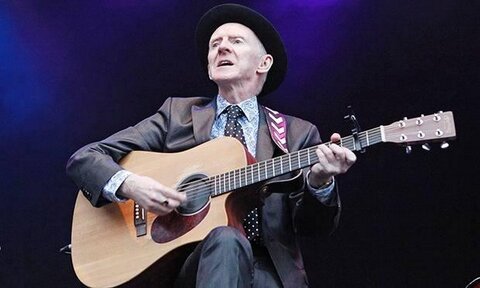
"I am a gay, Irish, Catholic, alcoholic Pogue who is about to die from cancer"

"I am a gay, Irish, Catholic, alcoholic Pogue who is about to die from cancer"
CCG Staff - 16/10/2013 - 22:37
Lingua: Gaelico irlandese
PÉIRE SÚL DONN
Tráthnóna samhraidh, siar ó thuaidh
Mé suite ann gan anam
Bhí seanfhear insa chúinne ’chan
‘Where the Water Lillies Grow’.
Is Johnny ón jukbox 'canadh
faoin rud ar ‘dtugtar grá
Agus conas taoi, cé thú féin ar sé,
Is cá bhfios duitse, a amadáin?
Le fuil is bás ag liú faoin spéir,
Shín mé siar ar thalamh
Bhí cosa ’s géaga na bhfear óg
scaipthe faoin ngréin
Iad ag guí, ag eascainí, ‘s ag guí,
Ag guí is ag eascainí fola
Is an t-aon rud ann a chonaic mé,
Ná an péire súl donn ag stánadh orm féin
Nuair a thánamar thar n-ais, ‘nár gcodanna i bpéin
Ní raibh péire súl donn ag féachaint orm féin
Is ar fán mé, ar fán mé, ar fán mé go deo,
Le haghaidh péire súl donn.
D’fhéachas air is d’fhéach sé orm,
Ní raibh agam dó ach fuath
Bhí Ray is Philomena ag ceol,
Faoin aisling d’éalaigh uaim
Chonac an sruth is fós an cnoc,
Is a shúile donna ag feitheamh
Agus smaoinigh mé ar phéire súl donn,
Bhí tráth ag feitheamh liom
Sna meisce bhíos is d’imíos liom,
Ag crúbáil romham nó mé ag siúl
Is bhí fuaim ocrach ar an ngaoth,
Leis na ballaí a bhíos ag liú
Is chuala mé glór ón am fadó,
Ón seana chanáil
Is bhí scol ó na héin i mbarr na gcrann
Is an ghaoth go séimh ag gáire
Is ar fán mé, ar fán mé, ar fán mé go deo
Is ar fán mé, ar fán mé, ar fán mé go deo
Is ar fán mé, ar fán mé, ar fán mé go deo
Le haghaidh péire súl donn.
Le haghaidh péire súl donn
Tráthnóna samhraidh, siar ó thuaidh
Mé suite ann gan anam
Bhí seanfhear insa chúinne ’chan
‘Where the Water Lillies Grow’.
Is Johnny ón jukbox 'canadh
faoin rud ar ‘dtugtar grá
Agus conas taoi, cé thú féin ar sé,
Is cá bhfios duitse, a amadáin?
Le fuil is bás ag liú faoin spéir,
Shín mé siar ar thalamh
Bhí cosa ’s géaga na bhfear óg
scaipthe faoin ngréin
Iad ag guí, ag eascainí, ‘s ag guí,
Ag guí is ag eascainí fola
Is an t-aon rud ann a chonaic mé,
Ná an péire súl donn ag stánadh orm féin
Nuair a thánamar thar n-ais, ‘nár gcodanna i bpéin
Ní raibh péire súl donn ag féachaint orm féin
Is ar fán mé, ar fán mé, ar fán mé go deo,
Le haghaidh péire súl donn.
D’fhéachas air is d’fhéach sé orm,
Ní raibh agam dó ach fuath
Bhí Ray is Philomena ag ceol,
Faoin aisling d’éalaigh uaim
Chonac an sruth is fós an cnoc,
Is a shúile donna ag feitheamh
Agus smaoinigh mé ar phéire súl donn,
Bhí tráth ag feitheamh liom
Sna meisce bhíos is d’imíos liom,
Ag crúbáil romham nó mé ag siúl
Is bhí fuaim ocrach ar an ngaoth,
Leis na ballaí a bhíos ag liú
Is chuala mé glór ón am fadó,
Ón seana chanáil
Is bhí scol ó na héin i mbarr na gcrann
Is an ghaoth go séimh ag gáire
Is ar fán mé, ar fán mé, ar fán mé go deo
Is ar fán mé, ar fán mé, ar fán mé go deo
Is ar fán mé, ar fán mé, ar fán mé go deo
Le haghaidh péire súl donn.
Le haghaidh péire súl donn
inviata da Gabriel Rosenstock - 28/7/2018 - 16:47
×
![]()

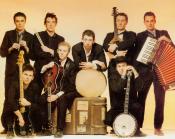
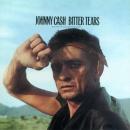
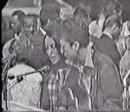
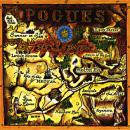
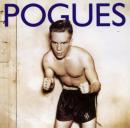


A young man is drinking, drowning his heartache while Johnny Cash plays on the jukebox. An old drunk corners him and begins to ramble about his own life, about how he came back from the war to discover his girl had gone off with another.
The young drinker’s immediate reaction is to despise the old sot for spoiling his orgy of self pity, and to stumble out of the pub in a rage. But then, he reconsiders. Perhaps he realises the old man has had much the harder life, and so develops a sense of perspective about his own. Or maybe he throws himself into the canal in despair. The issue is left unresolved, but the air of sorrow and entwined lives is left hanging by one of the Pogues’ most effective works.
from Pop matters
Un giovane sta bevendo, annegando il suo dolore nell'alcool mentre Johnny Cash canta dal jukebox. Un vecchio ubriaco lo avvicina e inizia a divagare sulla sua vita, su come non appena tornato dalla guerra ha scoperto che la sua ragazza se ne era andata con un altro.
La reazione immediata del giovane alcolista è di disprezzare il vecchio ubriacone per aver rovinato la sua orgia di auto-commiserazione e di uscire dal pub furioso. Ma poi riflette. Forse si rende conto che l'anziano ha avuto una vita molto più difficile, sviluppando così una prospettiva sulla propria situazione. O forse si getta nel canale preso dalla disperazione. La questione rimane irrisolta, ma l'aria di tristezza e di vite intrecciate resta sospesa in uno dei lavori più efficaci dei Pogues.
Il genio di MacGowan, il modo in cui riusciva a soffiare via la polvere da tradizioni musicali secolari, raramente si è manifestato in modo altrettanto grandioso e struggente. Di primo acchito, A Pair of Brown Eyes è una di quelle ballate celtiche marinate nella birra che tutti cantano assieme alla fine di una lunga nottata al pub. Dietro a MacGowan, la band fila magnificamente, con il banjo e la fisarmonica che evocano immagini di dolci colline irlandesi. Ma il testo è tutt’altro che allegro: un reduce di guerra ascolta canzoni country al jukebox di un bar, mentre ricorda ciò che ha patito (“Le braccia e le gambe degli uomini erano sparpagliate ovunque”) e ciò che non potrà mai riavere indietro. Quando finalmente esce, sente gli uccelli e il vento, ma il suo peregrinare in cerca della serenità non finirà mai.
rollingstone.it